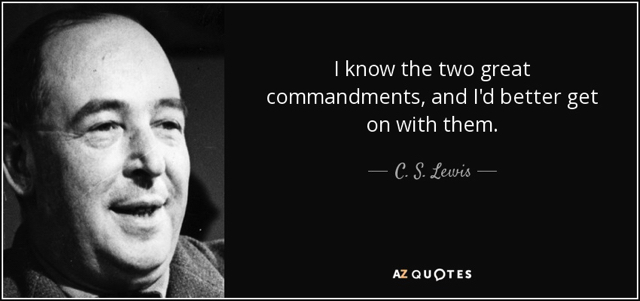Lev. 19:1-2, 9-18 • Ps. 119:33-40
1 Cor. 3:10-11, 16-23 • Matt. 5:38-48
The voice that says, “I am the Lord,” is the sound of love, an effectual word that elicits what it gives. “Thou shalt love the Lord thy God will all thy heart, and will all thy soul, and with all thy mind. This is the first and great commandment. And the second is like unto it: Thou shalt love thy neighbor as thyself” (BCP, p. 324; Matt. 22:37-40). God is the source of a double command and the singular grace of its fulfillment. Given human folly, this is a hard word. The God who says “Love!” says “be holy” and “you shall fear your God” (Lev. 19:2, 14).
“In the order of commanding, the love of God is first; the love of neighbor, however, is first in the order of doing” (St. Augustine, In Ioannem, tract. 17, my translation). Why? “If you do not love the brother whom you see, how will you be able to love the God whom you do not see?” (Augustine and 1 John 4:20). And yet, how often the neighbor stands as a real or imagined enemy, how often Cain kills Abel, how often a living soul falls upon its own sword.
The love that God commands is sourced from God’s being. Love is the impossible possibility that empowers and instructs, saying: reap not to the edge of your field, or gather the gleanings of your harvest; you shall not strip the vineyard bare, or gather fallen grapes; you shall not steal; you shall not deal falsely; do not lie to one another; do not defraud; do not keep for yourself the wages of a laborer; do not revile the deaf or put a stumbling block before the blind; you shall not profit by the blood of your neighbor; do not take revenge or bear a grudge (see Lev. 19:9-18).
Love is a sober justice that acknowledges the common blood of a single humanity, every drop of which coursed through the flesh of Christ and ran from his pierced body like a new deluge over the face of the earth. This is not, however, blood in the Nile, the canals, rivers, ponds, and vessels of an ancient or modern enemy. This is the blood of the Lamb whose hot redness makes white the dress of the baptized and the garment of martyrs.
We are not without guidance. There are things to be done and things to be left undone. Your neighbor is another you, another human being, one for whom Christ came, and lived, and died, and rose again, and lives forevermore.
Guidance is a great help, but it will not cover every exigency. What does it mean to love one’s neighbor in a dense and complex situation? It will involve moments of moral clarity and moments of confusion. Thus risk is unavoidable, which is why both forgiveness and judgment are so necessary. We will need to be forgiven for harm caused by good intention, and we will need, in God’s time, to be stripped of our obsessive tendencies to make others pay for our blundered efforts at good will and good action.
Amid moral risk, however, we have the sure foundation of Jesus Christ our Lord. Others, and we ourselves, build upon that foundation. We will build well and we will build poorly. We will get a reward or we will get purging fire. In either case, “the builder will be saved” (1 Cor. 3:15). God loves you, forgives you, burns you clean for your good, making you a pure sacrifice to the glory of his name. Go forth.
Look It Up
Read the Epistles of John.
Think About It
Love, holy, fear.










